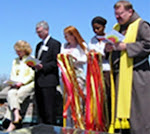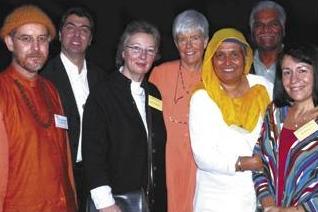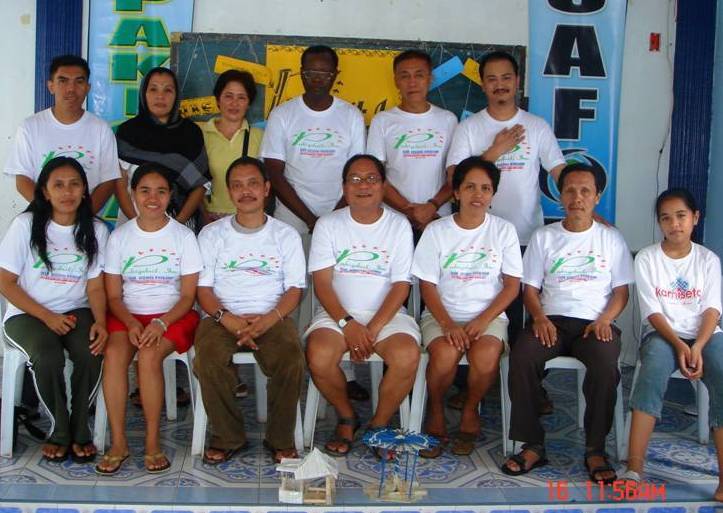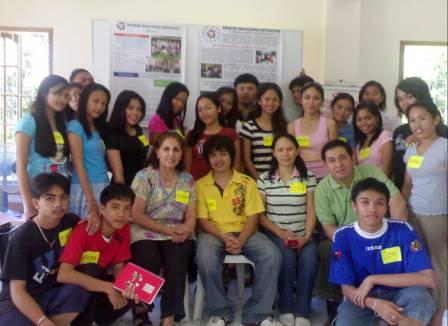 This section features central themes and subject matters viewed from the perspective of the different religions and faith traditions.
This section features central themes and subject matters viewed from the perspective of the different religions and faith traditions.Beliefs and ideas concerning the origin of the earth and human beings are an important part of the belief system in religions. Many of these stories are not intended to be factual but are intended for literary interpretation. They are symbolic or true to some extent only in a spiritual sense.
CREATION FROM ISLAM
It is God who has created the heavens and the earth, and all between them, in six days, and is firmly established on the throne (of authority): ye have none, besides Him, to protect or intercede (for you): will ye not then receive admonition? He rules )all) affairs from the heavens to the earth: in the end will (all affairs) go up to Him, on a Day, the space whereof would be (as) a thousand years of your reckoning. Such is He, the Knower of all things, hidden and open, the Exalted (in power), the Merciful; He who has made everything which He has created most good: He began the creation of man with (nothing more than) clay, and made His progeny from quintessence of the nature of a fluid despised; But He fashioned him in due proportion and breathed into him something of His spirit. And He gave you (the faculties of) hearing and sight and feeling (and understanding); little thanks do ye give!
CONFUCIANISM
The Great Primal Beginning (t'ai chi) generates... the two primary forces [yang and yin]. The two primary forces generate the four images. The four images generate the eight trigrams. The eight trigrams determine good fortune and misfortune. Good fortune and misfortune create the great field of action.
- I Ching, Great Commentary 1.11.5-6
CREATION FROM HINDUISM
This universe existed in the shape of darkness, unperceived, destitute of distinctive marks, unattainable by reasoning, unknowable, wholly immersed, as it were, in deep sleep.
CREATION FROM JUDAISM & CHRISTIANITY
In the beginning God created the heavens and the earth. The earth was without form and void, and darkness was upon the face of the deep; and the Spirit of God was moving over the face of the waters.
And God said, "Let there be light"; and there was light. And God saw that the light was good; and God separated the light from the darkness. God called the light Day, and the darkness he called Night. And there was evening and there was morning, one day.
And God said, "Let there be a firmament in the midst of the waters, and let it separate the waters from the waters." And God made the firmament and separated the waters which were under the firmament from the waters which were above the firmament. And it was so. And God called the firmament Heaven. And there was evening and there was morning, a second day.
And God said, "Let the waters under the heavens be gathered together into one place, and let the dry land appear." And it was so. God called the dry land Earth, and the waters that were gathered together he called Seas. And God saw that it was good. And God said, "let the earth put forth vegetation, plants yielding seed, and fruit trees bearing fruit in which is their seed, each according to its kind, upon the earth." And it was so. The earth brought forth vegetation, plants yielding seed according to their own kinds, and trees bearing fruit in which is their seed, each according to its kind. And God saw that it was good. And there was evening and there was morning, a third day.
And God said, "Let there be lights in the firmament of the heavens to separate the day from the night; and let them be for signs and for seasons and for days and years, and let them be lights in the firmament of the heavens to give light upon the earth." And it was so. And God made the two great lights, the greater light to rule the day, and the lesser light to rule the night; he made the stars also. And God set them in the firmament of the heavens to give light upon the earth, to rule over the day and over the night, and to separate the light from the darkness. And God saw that it was good. And there was evening and there was morning, a fourth day.
And God said, "Let the waters bring forth swarms of living creatures, and let birds fly above the earth across the firmament of the heavens." So God created the great sea monsters and every living creature that moves, with which the waters swarm, according to their kinds, and every winged bird according to its kind. And God saw that it was good. And God blessed them, saying, "Be fruitful and multiply and fill the waters in the seas, and let birds multiply on the earth." And there was evening and there was morning, a fifth day.
And God said, "Let the earth bring forth living creatures according to their kinds, cattle and creeping things and beasts of the earth according to their kinds." And it was so.
And God made the beasts of the earth according to their kinds, and the cattle according to their kinds, and everything that creeps upon the ground according to its kind. And God saw that it was good.
Then God said, "Let us make man in our image, after our likeness; and let them have dominion over the fish of the sea, and over the birds of the air, and over the cattle, and over all the earth, and over every creeping thing that creeps upon the earth." So God created man in his own image, in the image of God he created him; male and female he created them. And God blessed them, and God said to them, "Be fruitful and multiply, and fill the earth and subdue it; and have dominion over the fish of the sea and over the birds of the air and over every living thing that moves upon the earth."
And God said, "Behold, I have given you every plant yielding seed which is upon the face of all earth, and every tree with seed in its fruit; you shall have them for food. And to every beast of the earth, and to every bird of the air, and to everything that creeps on the earth, everything that has the breath of life, I have given every green plant for food." And it was so.
And God saw everything that he had made, and behold, it was very good. And there was evening and there was morning, a sixth day.
Thus the heavens and the earth were finished, and all the host of them. And on the seventh day God finished his work which he had done. So God blessed the seventh day and hallowed it, because on it God rested from all his work which he had done in creation.
- Bible, Genesis 1.1-2.3
THE INDIGENOUS (FILIPINO) IDEA OF CREATION
"To create" is commonly understood as "to produce something out of nothing." When God said, "Let there be light," and there was light, he created light out of nothing. Before that there was only darkness and no material existed out of which the light was made.
Creation out of nothing is called a "first creation," and is found principally in the Judaeo-Christian-Moslem tradition. It requires as creator a perfectly omnipotent being, thoroughly self-sufficient and capable of producing his own creation independent of any other power.
Creation as conceived of by early Filipinos is more in the nature of a "second creation," therefore the making of a particular object out of some underlying material.
We find this in all Philippine creation stories. The creator makes a specific object: the world, the tree or man. Before the creation, the world, the tree or man were nonexistent; a sub-stratum is used to form them- such as wood, clay or rock. In many traditions these substances were always there, from the very beginning. Creation simply formed them into specific objects (Demetrio 1978). Thus Melu, the Bagobo creator, used the leavings of his body skin, which he constatnly scrubbed off, in order to fashion the earth. In the Bikol account, after their unsuccessful rebellion against their grandfather, Langit the sky, the copper body of Bulan became the moon, and the golden body of Aldao became the sun (Bonto, undated).
In other native traditions, not of the Philippines, a ready world was simply lifted up with a fish hook from the bottom of the primordial ocean by the creator. Or, as with the Native Americans, the swimming animals brought up slime from the bottom of the sea, spread it over the back of another animal and it grew into the world (Kirtley 1957).
In many of our indigenous creation myths, the creator has a "brother," who is envious, short of imagination, and who is responsible for the defects and imperfections of the resulting creation. Thus in the Bagobo myth, after Melu had almost finished making figures of the first people, his brother Fun Tao Tana came up from his dwelling place in the lowest tier of the underworld, and demanded that the making of the noses be left to him. Melu, to avoid strife, agreed just before he left for his home in the sky. But Fun Tao Tana placed them upside down. As a result when the rains came, the first people almost drowned because the water flowing from their heads entered their wide-open nostrils. Seeing their plight, Melu came down form his place in the sky and reset the noses.
In a Manuvu myth, Manama's mirror image, the evil Ogassi, envious of the figures the good god had set out to dry, managed to incorporate a few white abaca strands into the clay. Hence the creatures became immortal no longer. They were doomed to grow white hair, get old and die.
The Bukidnons of the Central Highlands of Mindanao have one of the riches troves of oral literature. In their myth of creation, Magbabaya's bad brother, Mangilala, interfered with his clay figures of humans by giving them thin skins and breathing into them. Luckily, Magbabaya covered the extremities of their fingers and toes with superior material from the sky. These became their nails. But sometimes, humans are tempted to do evil - thanks to Mangilala's breath (Cole 1956).
What the motif of the "bad brother" may be saying is that the good and the bad, the positive and the negative, life and death are intertwined in life. One is not possible without the other.
(Source: "The Soul Book" Demetrio et al, GCF Books, 1991, Quezon City, Philippines)










